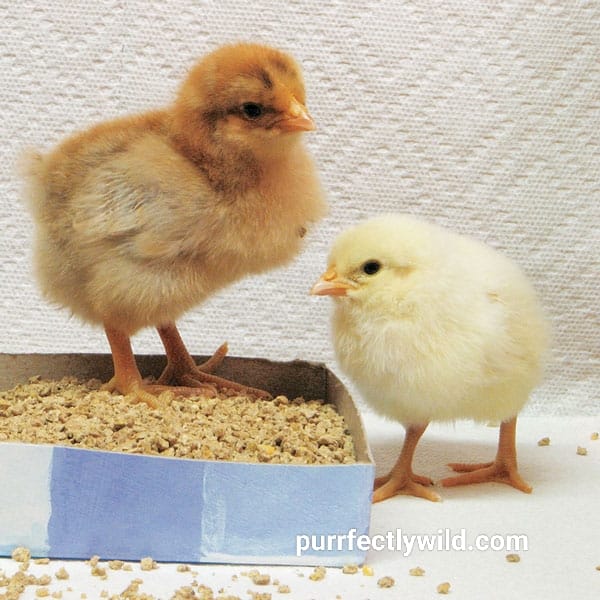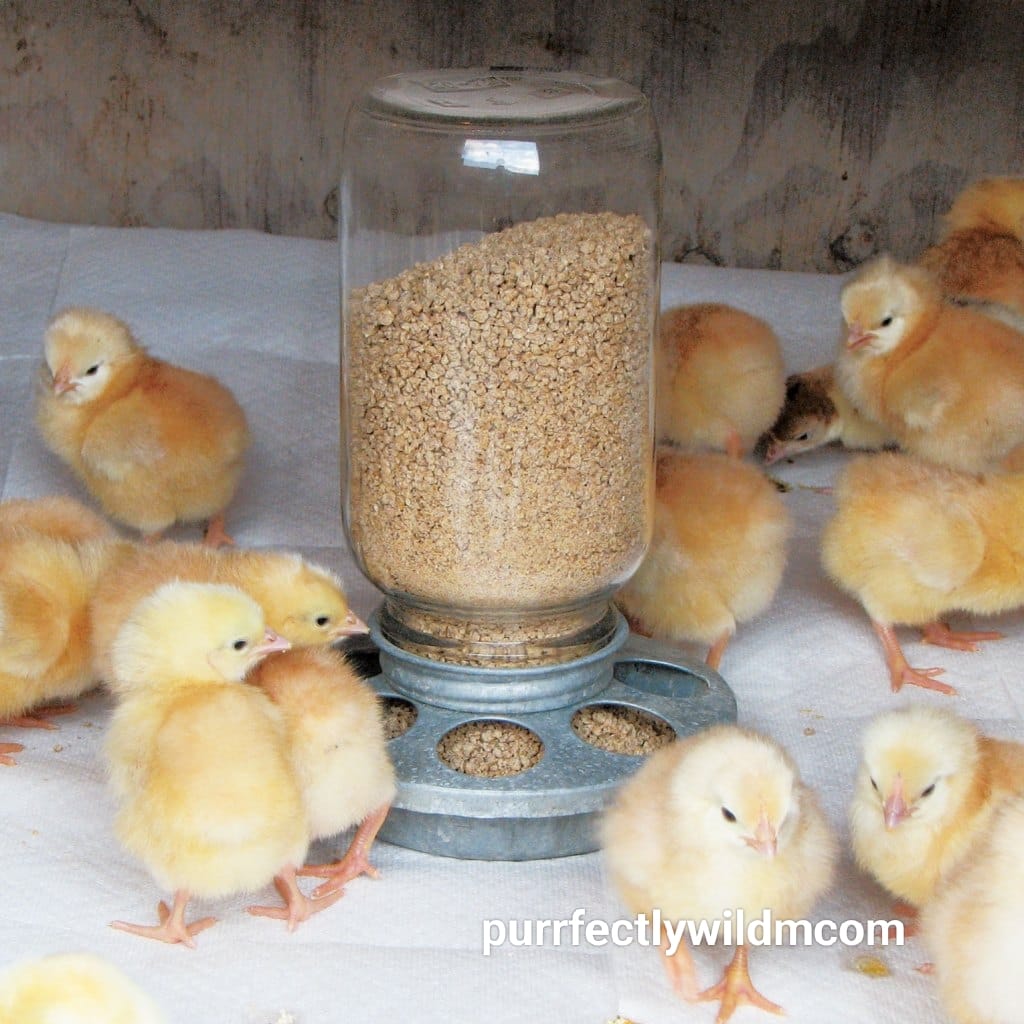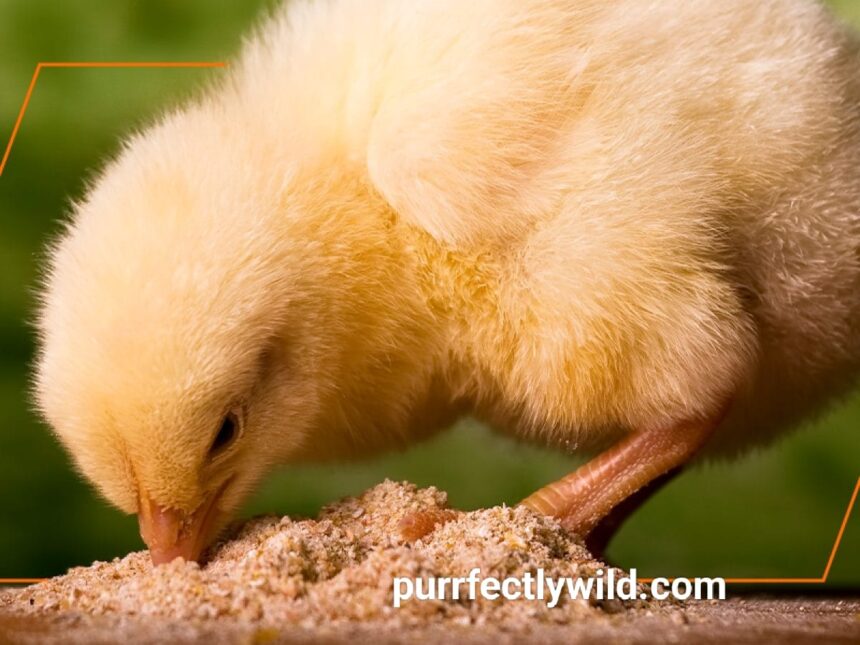When you bring your new baby chicks home from the store or hatch them yourself, their feeding options are limited. It is important to give them the proper food for their growth and not to give them things that could injure them, such as raw onions or keep them from getting the nutrients they need, such as scratch grains. Featuring a high protein percentage, a medicated chick starter or grower feed is the main food you need to feed your chicks. There are several brands to choose from; any will work well to keep them healthy during their young lives. Once your chicks reach 6 or 8 weeks, you can switch to a lower protein feed to better control the chickens’ weight. Always offer water along with the chick starter feed. Kickstarter is also called ‘starter feed’.
Preparing the proper chick starter is easy. The store-bought variety or homemade version can be any of several brands. It can also be crumbled or mashed, and today, you can find medicated and non-medicated chick starters. The medicated kind has amprolium added to the feed to prevent coccidiosis, a deadly and common parasitic condition in baby chickens. There is virtually no difference in the two at all. Some people feel cruel to offer a starving chick gravel grit, so they use the starter that contains the medication. Feeding also changes as the chicks age. The baby chickens eat chick starters their whole lives. They will start on it and continue to eat it through egg production. They also eat treats and other types of feeds as they get older.

Importance of Proper Nutrition
Proper feeding is one of the most important aspects of raising young birds and can be the difference between healthy growth and a long, stressful process. The feeding period in the first few weeks can, without question, set the tone and conditions for the following time. You can make all the effort to build a perfect, warm, and cozy brooder for the ideal moment of receiving your new bird pleasers, only to lose all your efforts in the blink of an eye just because you made a wrong choice in the food for your little birds. Providing all the necessary nutrients for your chicks’ correct growth and development is essential. In the first place, the amount of proteins and energy is required for the proper development of the chicken, going through vitamins for the proper growth, particularly A, B12, D, and K, and minerals like calcium, phosphorus, sodium, and magnesium.
Deficiencies in some nutrients such as these may contribute to malformations, increased diseases, slow growth, decreased egg production, decreased bone strength, and, in general, decreased profitability. At the same time, choose the right mix of food for baby chickens that can give you the option to optimize your broods and link the future in the best way. Nothing is more important than making a good choice concerning your feed, which should be balanced, special feed. Remember the importance of having access to clean water from the 2nd day after your chicks are born. This water is essential to help keep your chicks’ temperature constant and acts as a “pressure box” for the feeders that allow your chicks to eat. And remember! Dirty water can quickly provide many bacteria, parasites, and viruses, all simultaneously available. Always try to keep your water free from dirt by using special valves for your water supply in a suit; always clean and let your chicks drink comfortably.
How to Choose Chick Feed
Choosing the right chick feed is important for the healthy growth of your chicks. Here’s a simple guide to help you choose:
1. Types of Chick Feed
- Starter Feed: This is the most common type used for chicks up to 6 weeks old. It’s high in protein (around 18-20%) to support growth.
- Grower Feed: Given to chicks from 6 weeks to about 20 weeks. It has slightly less protein (16-18%) as they don’t need as much for growth.
- Medicated Feed: Contains a medication to prevent coccidiosis, a common disease in chicks. If you’re not vaccinating against coccidiosis, this feed can help protect your chicks.
- Non-Medicated Feed: Use this if your chicks have been vaccinated or if you prefer not to use medicated feed.
2. Consider Protein Content
- Young chicks need high protein for growth. Starter feeds typically have 18-20% protein.
- As chicks grow, they need less protein. Grower feeds have around 16-18% protein.
3. Organic vs. Conventional
- Organic Feed: Contains no synthetic pesticides, herbicides, or fertilizers. Good if you’re raising organic chickens.
- Conventional Feed: May contain synthetic additives but is more affordable.
- Crumbles: Easier for chicks to eat and digest.
- Pellets: Used for older chickens, not ideal for young chicks.
5. Supplements
- Provide grit or chick-sized crushed oyster shells if they’re not eating commercial feed exclusively.
- Always ensure they have access to fresh, clean water.
Tips:
- Buy fresh feed in small amounts to prevent spoilage.
- Store feed in a cool, dry place to keep it fresh.
- Check expiration dates on the feed bags.
By choosing the right feed at each stage of their growth, you’ll help your chicks grow into healthy, strong chicke

When to Transition Chicks to Regular Feed
Chicks should transition to regular feed at about 6 to 8 weeks old. At this stage, they no longer need the high protein content found in starter feed. Switch to a grower or finisher feed that contains around 16-18% protein. Gradually mix the new feed with the old to help them adjust. Ensure clean water is always available. Watch for signs of stress, like loss of appetite, to ensure thethey’re well. Keep them on this feed until about 18 to 20 weeks when they can switch to layer feed if they’re lthey’reens.
What is the daily food consumption of a chick?
A chick typically consumes about 1 to 2 ounces (28 to 56 grams) of feed per day during its first few weeks. As they grow, their daily consumption increases gradually. By the time they reach 6 to 8 weeks old, they may eat closer to 2 to 3 ounces (56 to 85 grams) of feed per day. Providing enough food and ensuring it’s high in nutrients is essential for healthy growth during the early stages.
Difference Between Chick Feed and Chicken Feed
Chick feed and chicken feed differ primarily in their nutritional content, designed for different growth stages.
- Chick Feed:
- High in protein (18-20%) to support rapid growth.
- Contains essential nutrients like vitamins and minerals.
- Fine texture for easy consumption by young chicks.
- Used from hatch until 6-8 weeks of age.
- Chicken Feed:
- Lower protein levels (16-18%) for adult chickens.
- Formulated for maintaining health and egg production (if for layers).
- Coarser texture, often pellets or crumbles.
- Can be layer feed, grower feed, or maintenance feed depending on age and purpose.
Each feed is tailored to the specific needs of chickens at various life stages.
What to Feed Baby Chicks
Baby chicks need specific care when it comes to feeding to ensure they grow healthy and strong. Here’s a detailed guide on what to feed baby chicks:
- Chick Starter Feed: The primary diet for baby chicks should be a specially formulated chick starter feed. This feed is high in protein, typically around 18-20%, which is essential for their rapid growth during the first few weeks of life. The feed comes in fine crumbles that are easy for chicks to eat and digest. Starter feed also contains essential vitamins and minerals to support their immune system and overall health. It’s important to provide this starter feed exclusively for the first 6-8 weeks.
- Medicated or Non-Medicated Starter Feed: You can choose between medicated and non-medicated starter feed. Medicated feed contains a small dose of amprolium, which helps prevent coccidiosis, a common intestinal disease in chicks caused by parasites. If your chicks haven’t been vaccinated for coccidiosis, using medicated feed can provide an extra layer of protection. However, if your chicks have already been vaccinated, non-medicated starter feed is perfectly fine.
- Fresh, Clean Water: Along with feed, it’s essential to provide baby chicks with fresh, clean water at all times. Chicks can get dehydrated quickly, especially under heat lamps, so check their water supply frequently. Adding a bit of electrolyte powder to their water for the first few days can help boost their energy levels and keep them hydrated, especially if they seem weak after hatching.
- Grit for Digestion: Although starter feed is designed to be easily digestible, if you plan to introduce treats or other foods to chicks after a few weeks, it’s important to offer chick grit. Grit consists of small, insoluble particles that help grind up food in their gizzards, aiding in digestion. It’s unnecessary if you’re only feeding them starter feed, but once you introduce other food items, providing grit is essential for their digestive health.
- Avoid Treats and Scratch Early On: During the first few weeks of life, it’s best to stick to the starter feed and avoid giving baby chicks any treats, table scraps, or scratch grains. These extras can dilute the balanced nutrition they need from their starter feed and may cause digestive issues. If you do introduce treats, keep them minimal and ensure that their primary food source remains starter feed.
- Supplements (Optional): In some cases, you might choose to add supplements like probiotics or vitamins to the chicks’ water or feed to support their immune systems and help prevent illness. Always check with a vet or poultry expert before adding any supplements, as the starter feed generally contains all the nutrients they need.
- Transition to Grower Feed: After about 6 to 8 weeks, you’ll gradually transition your chicks from starter feed to grower feed, which has slightly lower protein levels (16-18%) suitable for their next stage of development. To make the switch, mix a small amount of grower feed with their starter feed, gradually increasing the proportion of grower feed until they’re fully transitioned.
By following these guidelines, you’ll give your baby chicks the proper nutrition they need to grow into healthy, strong chickens. Clean water, the right feed, and attention to their digestive health are key factors in their early development.

What Not to Feed Baby Chickens
Feeding baby chickens requires careful attention to ensure they get the right nutrition for healthy growth. Here’s a list of things you should not feed baby chickens:
1. Moldy or Spoiled Food
- Any food that is moldy, spoiled, or stale can lead to serious health problems, including toxins that could cause illness or death. Always ensure feed is fresh and stored properly.
2. Raw Beans
- Raw or dried beans contain a toxin called phytohemagglutinin, which can be deadly to chickens. Cooked beans are safe, but raw beans are a serious hazard.
3. Salty Foods
- Salt can cause dehydration and kidney damage in chicks. Avoid feeding them processed foods or table scraps that contain high levels of salt, such as chips or crackers.
4. Avocado
- The skin and pit of an avocado contain persin, a toxin that can cause heart problems and death in chickens. It’s best to avoid avocado altogether.
5. Chocolate or Sugary Foods
- Chocolate contains theobromine, which is toxic to chickens. Likewise, sugary foods or candy can disrupt their digestive systems and cause imbalances in their diet.
6. Caffeine
- Coffee grounds, tea, or any caffeinated products can be harmful to chicks. Caffeine affects their central nervous system and can be fatal.
7. Citrus Fruits
- Although not deadly, citrus fruits like oranges, lemons, and grapefruits can interfere with calcium absorption, which is important for growing chicks, particularly if they will become laying hens.
8. Greasy, Fatty Foods
- Foods high in fat, like fried or greasy foods, can lead to obesity and liver problems. Stick to balanced, nutrient-rich feeds designed for their growth.
9. Uncooked Rice
- Contrary to popular belief, uncooked rice won’t harm chickens by expanding in their stomachs, but it’s still not ideal. It’s better to offer fully cooked rice in small quantities, as uncooked rice can be harder for chicks to digest.
10. Green Potatoes and Tomato Leaves
- The green parts of potatoes and tomatoes contain a toxin called solanine, which is harmful to chickens. Avoid feeding them any green potatoes, sprouting potatoes, or leaves from the tomato plant.
11. Onions and Garlic
- Large amounts of onions can lead to a condition called hemolytic anemia, which destroys red blood cells. Garlic is safe in small amounts but should not be fed regularly, as it can affect the flavor of eggs later on.
12. Raw Meat
- Raw meat can harbor bacteria like salmonella or parasites that could infect chicks. If you want to provide extra protein, it’s better to give them cooked eggs or mealworms.
13. Large, Hard Foods Without Grit
- If feeding treats or food outside of chick starter feed, ensure they are appropriately sized and provide chick grit to help with digestion. Without grit, chicks may struggle to digest larger or harder foods.
By avoiding these harmful foods and sticking to a balanced, high-protein starter feed, you’ll ensure your baby chicks grow healthy and strong. If you’re ever in doubt about whether a food is safe for chicks, it’s best to avoid it or consult with an expert.
Conclusion:
Feeding baby chickens requires careful attention to their specific nutritional needs. It’s crucial to provide a well-balanced diet through chick starter feed and avoid harmful or inappropriate foods. Sticking to safe, nutrient-rich options like starter feed ensures proper growth, strong immune systems, and overall health. Avoid giving chicks anything moldy, toxic, or hard to digest, as these can cause serious health issues. By following these guidelines and being mindful of their diet, you’ll raise strong, healthy chickens.
FAQs:
- What is the best feed for baby chicks?
- Chick starter feed is the best option, as it contains high protein (18-20%) and essential nutrients for proper growth during the first 6-8 weeks of life.
- Can baby chicks eat table scraps?
- It’s best to avoid table scraps for baby chicks, especially during the first few weeks. Stick to chick starter feed for balanced nutrition. If you introduce scraps later, make sure they’re safe and non-toxic.
- Why is medicated feed used for baby chicks?
- Medicated chick feed contains amprolium, which helps prevent coccidiosis, a parasitic disease common in chicks. It’s useful if chicks haven’t been vaccinated against the disease.
- What foods are toxic to baby chicks?
- Foods like avocado, chocolate, caffeine, raw beans, and green potatoes are toxic to baby chicks and can cause serious health issues, even death.
- Can I give baby chicks treats or snacks?
- It’s better to avoid treats for the first few weeks. If you do introduce treats later, offer them in moderation and provide chick grit to aid digestion. Stick to healthy, non-toxic options like finely chopped fruits or vegetables.





